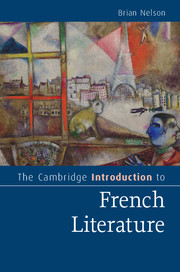Book contents
- Frontmatter
- Dedication
- Contents
- Preface
- Acknowledgements
- Chronology
- 1 Villon: a dying man
- 2 Rabelais: the uses of laughter
- 3 Montaigne: self-portrait
- 4 Corneille: heroes and kings
- 5 Racine: in the labyrinth
- 6 Molière: new forms of comedy
- 7 La Fontaine: the power of fables/fables of power
- 8 Madame de Lafayette: the birth of the modern novel
- 9 Voltaire: the case for tolerance
- 10 Rousseau: man of feeling
- 11 Diderot: the enlightened sceptic
- 12 Laclos: dangerous liaisons
- 13 Stendhal: the pursuit of happiness
- 14 Balzac: ‘All is true’
- 15 Hugo: the divine stenographer
- 16 Baudelaire: the streets of Paris
- 17 Flaubert: the narrator vanishes
- 18 Zola: the poetry of the real
- 19 Huysmans: against nature
- 20 Mallarmé: the magic of words
- 21 Rimbaud: somebody else
- 22 Proust: the self, time and art
- 23 Jarry: the art of provocation
- 24 Apollinaire: impresario of the new
- 25 Breton … Company: Surrealism
- 26 Céline: night journey
- 27 Sartre: writing in the world
- 28 Camus: a moral voice
- 29 Beckett: filling the silence
- 30 French literature into the twenty-first century
- Notes
- Further reading
- Index of authors and titles
- Index of genres, movements and concepts
- Cambridge Introductions to …
- References
5 - Racine: in the labyrinth
Published online by Cambridge University Press: 05 July 2015
- Frontmatter
- Dedication
- Contents
- Preface
- Acknowledgements
- Chronology
- 1 Villon: a dying man
- 2 Rabelais: the uses of laughter
- 3 Montaigne: self-portrait
- 4 Corneille: heroes and kings
- 5 Racine: in the labyrinth
- 6 Molière: new forms of comedy
- 7 La Fontaine: the power of fables/fables of power
- 8 Madame de Lafayette: the birth of the modern novel
- 9 Voltaire: the case for tolerance
- 10 Rousseau: man of feeling
- 11 Diderot: the enlightened sceptic
- 12 Laclos: dangerous liaisons
- 13 Stendhal: the pursuit of happiness
- 14 Balzac: ‘All is true’
- 15 Hugo: the divine stenographer
- 16 Baudelaire: the streets of Paris
- 17 Flaubert: the narrator vanishes
- 18 Zola: the poetry of the real
- 19 Huysmans: against nature
- 20 Mallarmé: the magic of words
- 21 Rimbaud: somebody else
- 22 Proust: the self, time and art
- 23 Jarry: the art of provocation
- 24 Apollinaire: impresario of the new
- 25 Breton … Company: Surrealism
- 26 Céline: night journey
- 27 Sartre: writing in the world
- 28 Camus: a moral voice
- 29 Beckett: filling the silence
- 30 French literature into the twenty-first century
- Notes
- Further reading
- Index of authors and titles
- Index of genres, movements and concepts
- Cambridge Introductions to …
- References
Summary
Where can I hide?
I cannot hide even in Hell
– Phaedra in Phèdre (IV, vi)‘Corneille depicts men as they ought to be; Racine depicts them as they are.’ This comment by the essayist Jean de La Bruyère (1645–96), in his Characters (Les Caractères, 1688), neatly states the differences between the two dramatists, whose sensibilities and visions of the world were indeed highly dissimilar. The protagonists of Corneille aspire to a kind of heroic transcendence through the exercise of their will; those of Jean Racine (1639–99) embody a human nature divided against itself, ravaged by conflicting impulses, helpless in the face of its own consuming desires. The suffering and defeat of Racine's protagonists are made all the greater by their agonized awareness of their fate, which they can neither fully comprehend nor do anything to avert. Corneille had sought to arouse in his audiences feelings of admiration; Racine seeks to arouse the Aristotelian responses of pity and fear.
The world of Racinian tragedy
The pessimism that marks Racinian tragedy has been widely attributed to his upbringing. Orphaned in infancy, he was brought up by relatives under the influence of the austere Jansenist strand in contemporary Roman Catholicism. Jansenism was named after its Dutch originator, the theologian Cornelius Jansen (1585–1638), who promoted the doctrine of predestination. The Fall, he taught, had led to the complete ruin of human nature, and since human nature was naturally sinful, all mankind was destined to go to Hell, except for a small minority saved by the direct and mysterious intervention of divine grace. Although Racine came to reject Jansenist belief in his early years, involving himself instead in court affairs and theatre, the emotional and intellectual influence of Jansenism was to haunt him all his life. His education at the Jansenist schools of Port-Royal gave him not only an intimate knowledge of Jansenist theology but also a remarkable grounding in Greek and Latin literature.
- Type
- Chapter
- Information
- The Cambridge Introduction to French Literature , pp. 32 - 38Publisher: Cambridge University PressPrint publication year: 2015

